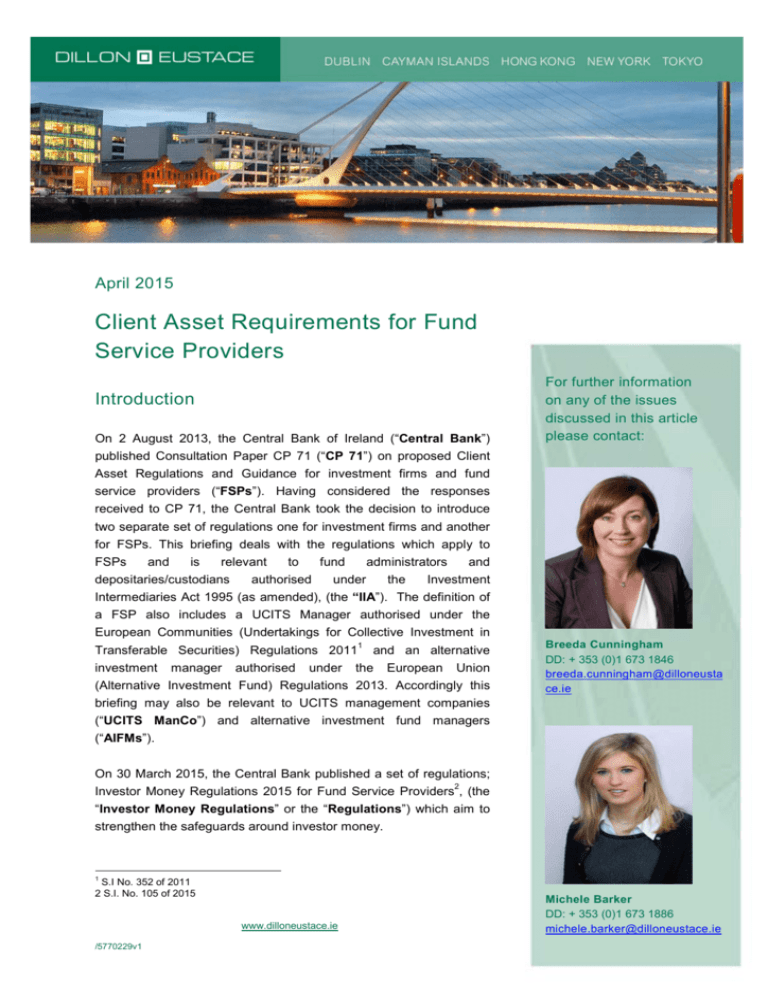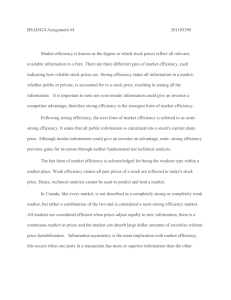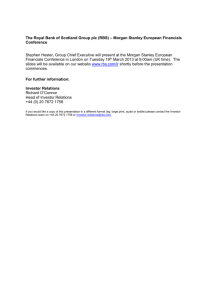
April 2015
Client Asset Requirements for Fund
Service Providers
Introduction
On 2 August 2013, the Central Bank of Ireland (“Central Bank”)
For further information
on any of the issues
discussed in this article
please contact:
published Consultation Paper CP 71 (“CP 71”) on proposed Client
Asset Regulations and Guidance for investment firms and fund
service providers (“FSPs”). Having considered the responses
received to CP 71, the Central Bank took the decision to introduce
two separate set of regulations one for investment firms and another
for FSPs. This briefing deals with the regulations which apply to
FSPs
and
is
relevant
to
fund
administrators
and
depositaries/custodians
authorised
under
the
Investment
Intermediaries Act 1995 (as amended), (the “IIA”). The definition of
a FSP also includes a UCITS Manager authorised under the
European Communities (Undertakings for Collective Investment in
Transferable Securities) Regulations 2011
1
and an alternative
investment manager authorised under the European Union
(Alternative Investment Fund) Regulations 2013. Accordingly this
Breeda Cunningham
DD: + 353 (0)1 673 1846
breeda.cunningham@dilloneusta
ce.ie
briefing may also be relevant to UCITS management companies
(“UCITS ManCo”) and alternative investment fund managers
(“AIFMs”).
On 30 March 2015, the Central Bank published a set of regulations;
2
Investor Money Regulations 2015 for Fund Service Providers , (the
“Investor Money Regulations” or the “Regulations”) which aim to
strengthen the safeguards around investor money.
1
S.I No. 352 of 2011
2 S.I. No. 105 of 2015
www.dilloneustace.ie
/5770229v1
Michele Barker
DD: + 353 (0)1 673 1886
michele.barker@dilloneustace.ie
The Central Bank has published guidance (“Guidance on Investor Money Regulations for Fund
Service Providers”) to assist FSPs to comply with the Investor Money Regulations. The Investor
Money Regulations will come into operation on 1 April 2016.
On the publication of the Regulations, Director of Markets Supervision, Gareth Murphy, said "The
publication of these Regulations marks a significant development with regard to the safeguarding of
client assets and investor money in Ireland. The development of these Regulations is the outcome
of a lengthy period of industry consultation with investment firms and funds service providers. The
Central Bank will closely monitor the implementation of these Regulations so as to ensure that our
aim of enhancing investor protection and safeguarding client assets is achieved."
Who do the Regulations apply to?
The Investor Money Regulations apply to FSPs when holding investor money. The definition of a
FSP includes (i) a person who is authorised under the IIA to carry out (a) the administration of
collective investment schemes or fund accounting services or acting as a transfer agent or
registration agent for such schemes, or (b) custodial operations involving the safekeeping and
administration of investment instruments, (ii) UCITS ManCos, (iii) AIFMs and (iv) credit institutions
which act as a depositary for investment funds or provides fund administration services to such
funds. Accordingly, the Investor Money Regulations will apply to fund administrators and to
depositaries/custodians authorised under the IIA, to UCITS ManCos, and AIFMs and certain credit
institutions when they hold investor money.
When does a FSP hold investor money?
The Investor Money Regulations are issued pursuant to section 48 of the Central Bank (Supervision
and Enforcement) Act 2013 and apply to FSPs when holding investor money.
The Investor Money Regulations provide that a FSP will be deemed to hold investor money where:
(i)
It has been lodged into a collection account of a credit institution located and authorised in
the EEA, a signatory state to the Basel Capital Convergence Agreement of July 1988 or in
Jersey, Guernsey, the Isle of Man, Australia or New Zealand;
(ii)
(iii)
It is held in the name of the FSP or any nominee of the FSP; and
The FSP has the capacity to effect transactions on that collection account.
The term collection account is defined as meaning an “account opened with a third party by a fund
service provider to hold money to deliver from an investor to an investment fund or from an
investment fund to an investor”. Accordingly, the term “collection account” is designed to capture an
account operated by a FSP where monies are transferred from the investor to the FSP for onward
transmission to the investment fund (the “Fund”) and likewise where monies flow back from the
Fund to the Collection Account for onward transmission to the underlying client. In other words the
/5770229v1
Investor Money Regulations will apply to monies in a collection account where that account is held
in the name of the FSP or any nominee of the FSP.
The Guidance on Investor Money Regulations for Fund Service Providers specifically provide that if
the collection account is an asset of the Fund (i.e. where the Fund has opened a collection account
in its name with a credit institution) the Investor Money Regulations will not apply.
Six Core Principles of the Investor Money Regulations
The Guidance on Investor Money Regulations for FSPs explicitly provides that the Investor Money
Regulations are applicable to a FSP that is authorised in the State and is holding investor money
irrespective of whether the investor money is in respect of Irish or non-Irish Funds.
The Investor Money Regulations are set out under six headings which the Central Bank regards as
the six core investor money principles of an investor money regime:
1.
Segregation
A FSP should physically hold, or arrange for the holding of investor money separate from the FSP’s
own assets and maintain accounting segregation between the FSP’s own assets and investor
money.
2.
Designation and Registration
A FSP should ensure that investor money is clearly identified in its internal records and in the
records of third parties. The investor money must be identifiable from the FSP’s own assets.
Under the Investor Money Regulations a FSP should obtain an Investor Money Facilities Letter
where it deposits investor monies with a third party. This letter will governs the relationship with the
FSP and the third party.
3.
Reconciliation
A FSP should keep accurate books and records to enable it at any time and without delay to
provide an accurate record of investor money held by the FSP for each investor and the total held in
the collection account. Regulation 5(1) of the Investor Money Regulations requires a FSP to
reconcile collection accounts on a daily basis.
4.
Daily Calculation
/5770229v1
Each working day, a FSP should ensure that the aggregate balance of all collection accounts as at
the close of business on the previous working day is equal to the amount it should be holding on
behalf of investors.
5.
Risk Management
A FSP should ensure that it applies systems and controls that are appropriate to identify risks in
relation to investor money and should put in place mitigants to counteract these risks.
6.
Client Asset Examination
A FSP should engage an external auditor to report at least on an annual basis on the FSP’s
safeguarding of investor money.
Conclusion
The Regulations will ensure that FSPs will have stronger systems and controls in place to protect
the ownership rights of investors. In addition FSPs will have a process in place which, in the event
of insolvency, will facilitate the expeditious return of investor money. It is hoped that the revised
regime will prevent a repeat of cases such as MF Global, Lehman Brothers and Custom House
Capital in Ireland where individual investors lost significant amounts of money.
Dublin
33 Sir John Rogerson’s Quay, Dublin 2, Ireland. Tel: +353 1 667 0022 Fax: +353 1 667 0042.
Cayman Islands
Landmark Square, West Bay Road, PO Box 775, Grand Cayman KY1-9006, Cayman Islands. Tel: +1 345 949
0022 Fax: +1 345 945 0042.
Hong Kong
604 6F Printing House, 6 Duddell Street, Central, Hong Kong. Tel: +852 352 10352.
New York
245 Park Avenue, 39th Floor, New York, NY 10167, U.S.A. Tel: +1 212 792 4166 Fax: +1 212 792 4167.
Tokyo
12th Floor, Yurakucho Itocia Building, 2-7-1 Yurakucho, Chiyoda-ku, Tokyo 100-0006, Japan. Tel: +813 6860
4885 Fax: +813 6860 4501.
DISCLAIMER:
This document is for information purposes only and does not purport to represent legal advice. If you have any
queries or would like further information relating to any of the above matters, please refer to the contacts above
or your usual contact in Dillon Eustace.
Copyright Notice:
© 2015 Dillon Eustace. All rights reserved.
/5770229v1









